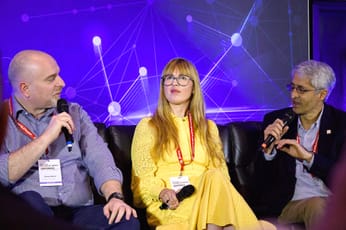Blogher: Finally, the Closing Session Summary
 Finally, here’s my write-up of the closing Blogher keynote. I’ve had this one on the back-burner, because it’s very much in my field — online publishing — and I wanted to mull over the issues it raised, but also because jet lag really, really gave me a kicking on the trip back from New York. (And now I’m writing this while I wait for a flight to Dublin. Ah, the jet-setting blogger lifestyle.)
Finally, here’s my write-up of the closing Blogher keynote. I’ve had this one on the back-burner, because it’s very much in my field — online publishing — and I wanted to mull over the issues it raised, but also because jet lag really, really gave me a kicking on the trip back from New York. (And now I’m writing this while I wait for a flight to Dublin. Ah, the jet-setting blogger lifestyle.)
This is by no means a complete write-up. You can find one of those on Licence to Roam.
The panel were four women from the major media in various stripes: Debi Fine, iVillage president; Marissa Mayer, VP of Search Poducts and User Experience at Google; Redbook Magazine editor in chief Stacy Morrison; and WashingtonPost.Newsweek Interactive CEO Caroline Little.
So, what do they think is needed for a media company to survive in the Web 2.0 world? Google has a fluid structure because analysts suggested that “organisations tend to mirror the process they’re putting into place,” Marissa Mayer. You have a hierarchical process, you’ll end up with a hierarchical company – and an inability to move quickly in a web world.
Caroline Little suggested that you have to be flexible and try different things. Interestingly, the firm had created a “skunk works” group filled with rather extreme programmers who are young and very creative, and thus able to get new things live very quickly.
Mayer suggested that Google’s “free day” policy – giving employees 20% of their time to work on personal projects – lead to 50% of the firm’s new launches. The message coming out of this loud and clear was that you need to free people up from the mundane routine of the day-to-day to create something special.
But what is that “something special”. Stacy Morrison of Redbook (nicely profiled on Six Log) described it as creating delight – “That’s what makes people come back”. That sounds a lot like one of my pet theories; that it’s magazines which strike an emotional relationship with their readers rather than a purely utilitarian one that create real relationships.
She also suggested that we’re beginning to see the end of the major destination site. I’m still not 100% sure what she meant by that, as there are clearly a group of websites that are major destinations in their own right – MySpace is the obvious answer. But is the point that visitors don’t go to “MySpace Central”, but to their own page within MySpace? That’s certainly a very different concept from the old portal idea.
Fine suggested that a portfolio approach works – see what sticks. And that seems like a very good idea. The incremental cost of launching a new blog is tiny compared to a paper or even a conventional online product.
A member of the audience suggested that sometimes the best new media writers are not people who are traditional authors or journalists, which in my experience is often true. Little Morrison suggested the controversial and contrary idea that people who are trained at journalism schools are the best: they can be coached through new methods. (My experience is that this is often as much a process of re-education as it is of education, but that’s meat for another post.)
However, she suggested that there are three groups of journalists, with different strengths (my interpretations in brackets):
-
Journalists who just want the facts, and who shape them into narrative structures. These are your classic news reporters and features writers.
-
Those who can talk about their lives off the cuff –* people who were ideal opinion columnists in the past, and who make perfect bloggers now.*
-
Those who produce “copy”; quick, sexy sell, sizzle copy – think product and fashion pages in consumer mags
“The customer has always ruled,” said Fine. “The customer now rules with a tighter, firmer hand.”
Because, of course, the customer can now easily become your competitor…
Sign up for e-mail updates
Join the newsletter to receive the latest posts in your inbox.












